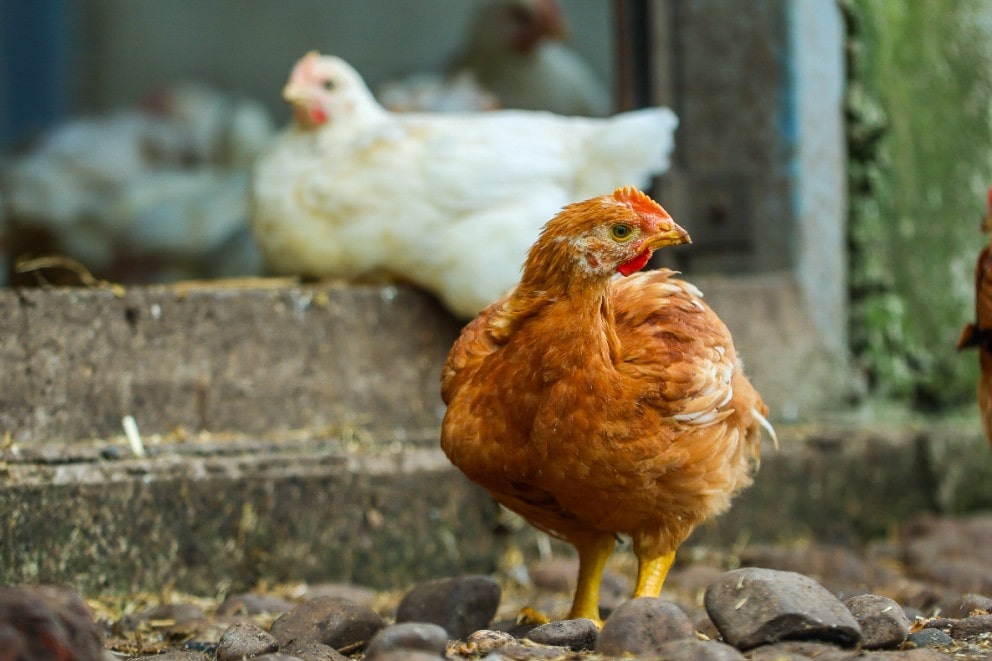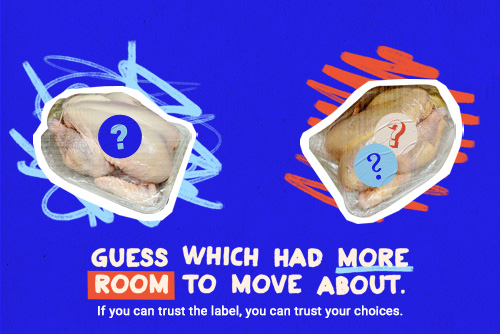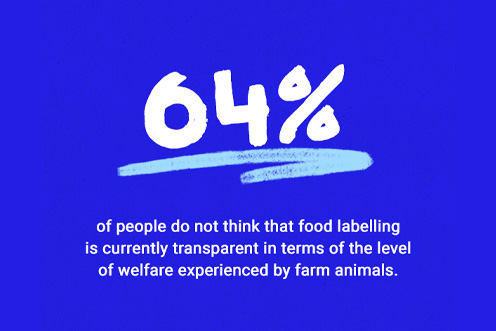Change starts with a choice
Campaign for mandatory food labelling to give consumers clear, transparent information about how animals were raised and slaughtered. #BetterLabelsBetterChoices

Now is the time to demand action on production labelling
In June 2025, we welcomed the UK Government’s long awaited response to the consultation on method of production labelling, as DEFRA pledged to consider reforms that could be a game-changer for animal welfare.
After more than a year of waiting, and thanks to the support of thousands of people like you, the results are finally in. An incredible 99% of individuals and 69% of organisations backed the idea of method of production labelling.
But with such overwhelming public support for clear, transparent labels, it’s time for the UK Government to turn words into action.
Email your MP today and call for change!
Food for thought - getting to know more about the food you eat
Can you tell how an animal has been reared before ending up on our supermarket shelves? Or the welfare of an animal used in processed and pre-packaged food? Did they have adequate space or enough light? Would you like the power to make more decisions around the food you eat? And would you like to be given the information to make those choices?
There is no mandatory UK legislation covering meat labelling
UK legislation requires the packaging of just two forms of animal products to include information on how the animal has been reared or caught: whole eggs laid by hens, and unprocessed fish such as salmon fillets.
The lives of farm animals vary greatly. Currently, the vast majority of labels on food products don’t provide a clear description of how the animal was reared or the welfare standards applied to the animals.
The introduction of mandatory labelling of food products has the potential to transform consumer behaviour and buying patterns, contributing to improved levels of animal welfare overall. This would cover the way in which they were reared (‘method of production’) and how they were slaughtered (‘method of slaughter’) such as whether they were pre-stunned or not.

Take back the power to make decisions
Misleading imagery on products, together with a lack of clear, easy-to-understand labelling information, means that consumers are less likely to make animal welfare a conscious factor when choosing animal products.
Mandatory labelling on animal products helps consumers make informed choices to support production processes that are more respectful of animal welfare. This choice can also influence the food industry to respond to the production of higher welfare produce, and to do so more quickly.

According to a recent poll*, 79% of UK respondents said they believe consumers can better ensure the improvement of animal welfare through purchasing habits.
What kind of labelling currently exists?
At the moment, there are a wide range of labels on animal product packaging giving information on the farming system used. Research** shows that, on average, consumers take between 41 and 81 seconds to choose their meat, so it isn’t easy to make informed choices about what we buy based on the current unconnected and limited labels.
Clear, mandatory labelling will help inform food service customers and shoppers in supermarkets about how the animals in the products they choose have been reared. This will support farmers and give them an incentive to raise animals to higher welfare standards, as well as provide consumers with more choice over the products they buy and consume.
What labels would improve consumer choice?
We are supporting the introduction of two types of labels that will inform consumers about:
- How that animal was kept.
- How that animal was killed.
We believe the development of a clear and accessible food labelling system will reflect consumer desire for greater transparency over how food is produced. Giving consumers a choice when buying food products can have a direct impact on animal welfare.
In a recent survey*, 84% of respondents said there should be more transparency in the food service industry around the products used in processed and pre-packaged foods. Meanwhile, 62% said they would be more likely to buy higher welfare animal products if they were labelled clearly.
Mandatory labelling worked for eggs
Once consumers are given more information, there is clear evidence that higher welfare is the preferred option. The introduction of the egg labelling scheme is a great example of how this works in practice. The Egg Marketing Regulation came into force in 2004 and since its introduction, the sales of cage-free eggs have significantly increased from approximately 30% to around 60% in the UK, with 95% of those free-range sales from the RSPCA Assured scheme.
Under the scheme, all shell eggs, including imports, must be labelled according to their method of production. The rules also require ‘country of origin’ labelling as well as a ‘non-EC standards’ mark for imports where there is “no sufficient guarantee as to the equivalence of rules”. The number of egg-laying hens kept in the alternative, non-cage systems steadily increased in the EU following the introduction of the scheme, indicating the positive impact of a higher level of transparency on the decisions consumers were making.
The current labelling system and defining criteria used for shell eggs deliver clear, simple, transparent information to consumers at the point of sale. This lets them make informed choices in line with their core values.
It’s clear that, given more choices, consumers want higher welfare, so our ask is simple: to extend this mandatory labelling system to all animal products.
Related campaigns
*Poll conducted by Sanvata Comres on an audience of 2,500 people UK-wide on 1 Feb 2023
